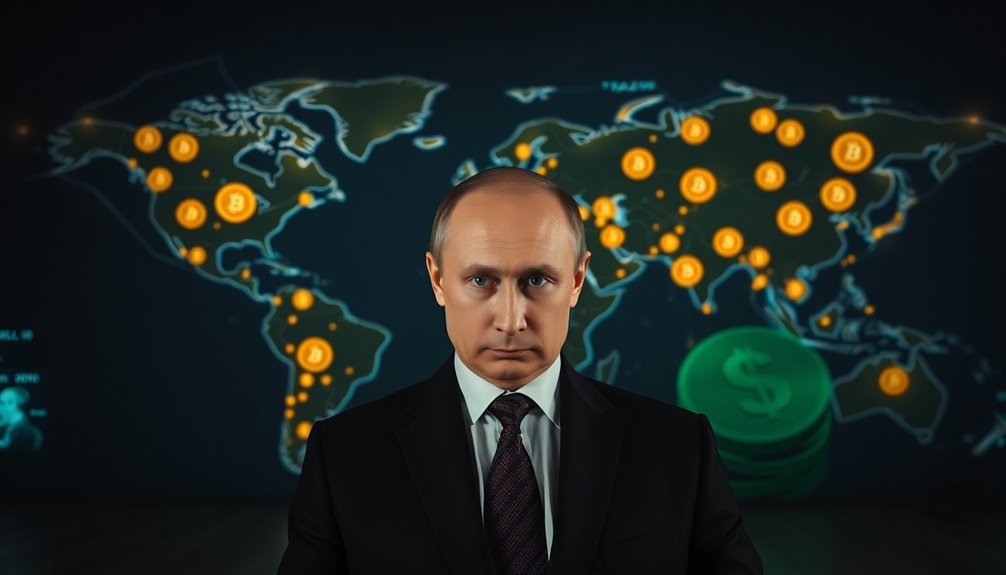Putin's crypto bomb is set to shake the very foundations of the dollar's global empire. By endorsing digital currencies, he aims to boost Russia's economy, circumventing around Western sanctions. This strategic shift lets Russia leverage its vast cryptocurrency resources while reducing reliance on the dollar. Legal reforms are in place to secure crypto transactions, enabling international trade without U.S. interference. As BRICS nations explore alternatives, the dollar's dominance faces a significant threat. If you're curious about how these developments could reshape global finance, there's more to uncover about the implications and future of this movement.
Key Takeaways
- Russia's strategic shift to cryptocurrency aims to bypass Western sanctions and reduce reliance on the US dollar in international trade.
- The digital ruble will enhance Russia's economic independence and modernize its financial system, potentially influencing BRICS nations' currency policies.
- Legal recognition of digital assets in Russia facilitates secure foreign trade transactions, diminishing the dollar's dominance in global markets.
- A growing trend of de-dollarization among countries reflects a desire to diversify currency holdings and mitigate risks associated with the U.S. financial system.
- Russia's significant investments in crypto mining position it as a leader in Bitcoin production, further undermining the dollar's global economic influence.
Putin's Bitcoin Endorsement

Putin's endorsement of Bitcoin signifies a strategic shift in Russia's economic policy. By championing cryptocurrency, you see Russia positioning itself to navigate the turbulent waters of Western sanctions. This move isn't just about tech; it's a calculated effort to reduce financial inefficiencies and enhance economic stability. Bitcoin becomes a key tool for fostering economic development, aligning with broader geopolitical and economic strategies.
Putin's stance also critiques the dominance of the US dollar, highlighting the $300 billion in Russian reserves frozen by Western nations. You recognize the growing sentiment against the dollar's use for political agendas, urging countries to rethink their currency reserves in dollars and euros. This endorsement echoes the idea that the dollar's reign is waning.
With Bitcoin and digital currencies increasingly seen as unstoppable forces, you can't ignore their potential to reshape the global financial landscape. No one can ban these technologies, and they'll continue to evolve, helping reduce costs and improve reliability. This aligns with Putin's assertion that nobody can ban Bitcoin, emphasizing the resilience of digital currencies.
Putin's endorsement marks a pivotal moment, signaling a future where cryptocurrencies could challenge traditional financial systems and the dollar's hegemony.
New Regulatory Reforms

In recent months, Russia has implemented significant regulatory reforms that officially recognize digital assets as financial instruments. This recognition classifies them as property under the country's Tax Code, aiming to integrate digital assets into the global crypto ecosystem. By establishing a solid regulatory framework, Russia aligns itself with other nations embracing crypto-friendly regulations.
One notable reform is the VAT exemption on transactions related to the sale of digital assets and services associated with crypto exchange platforms. While income taxes on cryptocurrency trading are set at 13% and 15%, corporate entities face a standard corporate tax rate of 25%. These tax incentives are designed to attract investments and foster the growth of the crypto sector. Additionally, the introduction of VAT exemptions for transactions involving digital assets aims to further stimulate investor interest in the Russian market.
Furthermore, the new laws provide clear definitions for key concepts in crypto mining, along with registration and reporting requirements for mining businesses. Foreign entities are prohibited from mining in Russia, and the government retains the right to restrict mining in specific regions.
To enforce compliance, miners must report to local authorities, and the tax service has launched a database of approved large-scale miners. These reforms reflect Russia's commitment to controlling and developing its crypto landscape.
Economic Strategy Shift

Shifting its economic strategy, Russia is leveraging cryptocurrencies to bolster its financial independence and navigate around Western sanctions. This move isn't just about innovation; it's a calculated response to geopolitical pressures.
By embracing digital assets, Russia aims to reshape its economic landscape and reduce reliance on the US dollar. Here are some key aspects of this strategy:
- Legal recognition of digital assets for foreign trade, enhancing transaction security.
- Bypassing traditional banking systems to facilitate transactions without Western interference.
- Significant investments in crypto mining, positioning Russia as a global leader in Bitcoin production, with the country ranking second globally in this sector.
- Introduction of the digital ruble to modernize its financial system while maintaining control.
- Creating a hub for cryptocurrency innovation, potentially influencing other BRICS nations.
Through these measures, you can see how Russia isn't only shielding itself from sanctions but also establishing a more independent financial ecosystem.
This shift marks a critical turning point in how countries can use cryptocurrencies as tools for economic resilience and innovation, ultimately challenging the dominance of traditional financial systems.
International Implications

As you consider the rise of digital currencies in international trade, you'll see how they're reshaping the landscape to challenge the dollar's dominance. Countries like Russia are pushing for alternatives to bypass sanctions and reduce reliance on Western financial systems. This shift could redefine global commerce and set the stage for a new era in economic power dynamics. With Russia having mined 54,000 bitcoins in 2023, the country is positioning itself as a formidable player in the global cryptocurrency landscape.
Digital Currencies in Trade
While many countries grapple with traditional trade barriers, digital currencies are emerging as a game-changing solution in international commerce. These currencies streamline cross-border transactions, making them faster and cheaper than ever before. By leveraging blockchain technology, you can bypass high currency exchange fees and intermediaries, thereby enhancing transaction efficiency. Additionally, maintaining positive energy can greatly influence the opportunities available in this evolving landscape.
Here are some key benefits of digital currencies in trade:
- Reduced Transaction Costs: Lower fees mean more profit for businesses.
- Faster Settlement Times: Transactions can be completed almost instantly.
- Increased Financial Inclusion: Unbanked populations gain access to financial services.
- Decentralized Payment Methods: This option enables cost-effective fund transfers in developing countries.
- Alternative Credit Information: Public ledgers can support SMEs in securing trade finance. Additionally, diversification of payment methods can help mitigate risks associated with currency fluctuations.
However, challenges like regulatory uncertainty and security concerns remain. Approximately 55% of businesses cite the lack of a unified regulatory framework as a significant hurdle. Furthermore, the significant cost reduction observed in cross-border transactions can particularly benefit smaller enterprises navigating international markets.
Despite these issues, the potential for digital currencies to reshape international trade is immense. By addressing these obstacles, you can reveal new opportunities for economic growth and inclusivity worldwide.
Challenging Dollar Dominance
Digital currencies aren't just changing how trade operates; they're also playing a role in challenging the long-standing dominance of the U.S. dollar. As political polarization and fiscal instability rise in the U.S., you might notice that investor confidence in the dollar is wavering. Events like government shutdowns and a soaring debt-to-GDP ratio contribute to this erosion of trust, making the dollar less appealing as a global safe haven.
At the same time, alternative currencies are gaining traction. The euro, despite its challenges, still holds potential, while the Chinese renminbi's share in global reserves is expected to grow. Countries are increasingly diversifying their holdings, with central banks collectively reducing their dollar reserves by 13% over the last decade. Moreover, as of 2022, the dollar was utilized in 54% of global foreign trade invoices, highlighting how entrenched it remains despite emerging alternatives.
Furthermore, new payment systems are emerging, allowing cross-border transactions without U.S. banks, further undermining dollar dominance. As the world splits into trading blocs and geopolitical tensions rise, nations are actively seeking alternatives to the dollar. If this trend continues, you could witness a significant shift in global finance, challenging the dollar's supremacy and reshaping international economic dynamics.
Technological Advancements

As you explore the landscape of next-generation payment systems, you'll notice significant shifts in how transactions are processed. The urgency for infrastructure development has never been clearer, especially as blockchain technology matures and demands rise. These advancements not only streamline payments but also enhance security and efficiency in our financial interactions. Additionally, the integration of zero-knowledge rollups is revolutionizing transaction throughput, enabling thousands of transactions per second while maintaining privacy.
Next-Generation Payment Systems
Embracing next-generation payment systems is transforming how we conduct transactions in an increasingly digital world. You'll find that these innovations not only enhance convenience but also bolster security. As technology evolves, several key advancements are reshaping the landscape of payments:
- Contactless Payments: With NFC technology, you can complete transactions in seconds, making shopping faster.
- Mobile Wallets: Your smartphone can now hold your cards, enabling seamless and efficient transactions.
- Blockchain Technology: This decentralized system guarantees transparency and security, so you can trust your transactions, aligning with the growing e-commerce demands in various sectors. The rise of AI in Business further supports these advancements, providing enhanced analytics and security measures. Additionally, the use of smart contracts allows for automated transactions that minimize the need for intermediaries. Furthermore, machine learning algorithms can be utilized to analyze transaction patterns, detecting anomalies to improve security.
- Biometric Authentication: Forget passwords; your fingerprint or face is your key, enhancing security considerably.
- Tokenization: This process replaces sensitive data with non-sensitive tokens, reducing the risk of data breaches.
These advancements not only improve your transaction experience but also pave the way for broader adoption of digital currencies, including cryptocurrencies. Furthermore, the integration of AI in fraud detection has led to a significant reduction in fraudulent transactions, enhancing overall trust in these systems.
As these systems become more integrated into daily life, they challenge traditional financial structures, creating a dynamic environment ripe for innovation and change.
You're witnessing a shift that could redefine the future of money.
Infrastructure Development Urgency
The rise of next-generation payment systems highlights a pressing need for robust infrastructure development in the cryptocurrency space. As you engage with this rapidly evolving ecosystem, understanding the core components of crypto infrastructure becomes essential. Each element plays a critical role in ensuring the security, efficiency, and scalability of blockchain technology. Decentralization is a key advantage of this infrastructure, as it reduces the risk of fraud by eliminating single points of control. Additionally, the implementation of AI-driven personalization in financial planning can enhance user experiences by tailoring services to individual needs.
Here's a breakdown of the core components:
| Component | Purpose | Examples |
|---|---|---|
| Robust Blockchain Tech | Decentralized ledger for transaction security | Bitcoin, Ethereum |
| Secure Wallet Solutions | Protect user assets and interact with dApps | MetaMask, Uniswap |
| Resilient Network Architecture | Scalable systems for high transaction throughput | ASIC miners, redundant servers |
| Rigorous Encryption Protocols | Safeguard transactions and user data | Zero-knowledge proofs, TLS |
| Interoperability Protocols | Enable communication across different blockchains | Chainlink CCIP
Legislative and Tax Framework

How does the legislative and tax framework surrounding cryptocurrency in Russia shape its future? The current structure is significant, offering both opportunities and challenges for users and businesses alike.
As cryptocurrencies gain traction, understanding these regulations is vital for maneuvering the landscape.
- Digital currencies are recognized as property, impacting foreign trade settlements.
- Only registered entities can engage in large-scale crypto mining, ensuring a controlled environment.
- Crypto transactions within the experimental legal regime (ELR) benefit from tax exemptions.
- Personal income tax rates are set at 13% for earnings up to 2.4 million rubles, encouraging participation. Additionally, income from crypto trading is classified as personal income, which affects tax obligations.
- Reporting and compliance requirements are stringent, with significant penalties for non-compliance.
With a framework that recognizes the potential of digital currencies while imposing limitations, participants must adapt.
The tax-free status within the ELR promotes innovation, yet the obligation to report activities to tax authorities adds a layer of complexity.
As you explore this evolving landscape, staying informed about legislative changes will be essential for harnessing the potential of cryptocurrencies in Russia.
Countering Western Sanctions

Russia's legislative framework on cryptocurrencies not only outlines opportunities for innovation but also plays a pivotal role in countering Western sanctions. By embracing cryptocurrencies, you can see how Russia aims to reduce its dependence on the US dollar and bypass restrictions imposed by Western countries. This strategic use of digital currencies offers an alternative route for acquiring restricted goods, effectively minimizing the influence of US-led financial systems.
As the rouble struggles against the dollar, the pressure on Russia's wartime economy intensifies. Inflation rates soar above 8%, and rising defense spending adds to the strain. In response, the Central Bank has implemented drastic measures, raising interest rates to 21% to manage the crisis. Legalization of crypto mining has also been signed into law, providing a boost to the industry amidst these challenges.
By utilizing cryptocurrencies, businesses can facilitate international payments, tapping into a network that circumvents traditional financial barriers.
However, it's important to recognize the technological and regulatory challenges posed by blockchain's transparency. While advanced methods may enhance anonymity, they remain susceptible to detection.
Nevertheless, Russia's financial authorities see potential in cryptocurrencies as they navigate through a landscape heavily influenced by Western sanctions, paving the way for a new era in international trade.
BRICS and Global Currency Debate

Amid growing global financial tensions, BRICS nations are pushing for a unified currency to assert economic independence and challenge the dominance of the US dollar and euro. This initiative is fueled by recent financial challenges and aggressive US policies, compelling these nations to seek alternatives.
Here's what you need to know:
- Economic Independence: BRICS aims to reduce reliance on the dollar and euro.
- De-Dollarization Trends: A new currency could weaken US sanctions and alter global market dynamics.
- Trade Imbalances: Internal economic disparities complicate the creation of a unified currency. Economic disparities among BRICS nations present significant challenges for the establishment of a new currency.
- Digital Currency Projects: Initiatives like m-Bridge are considered crucial for facilitating trade and reducing dollar usage.
- Diverse Perspectives: Countries like Brazil and India express mixed support for a common currency, highlighting a lack of consensus.
While progress is stymied by these challenges, discussions at the upcoming 2024 BRICS Summit could redefine the future of international finance.
The focus is shifting from a single currency to enhancing the role of BRICS currencies, suggesting that the dollar's dominance might be more vulnerable than it appears.
Future of Cryptocurrency in Russia

As the world grapples with shifting economic powers, the future of cryptocurrency in Russia is taking shape through a thorough legislative and regulatory framework.
The Russian government has recognized digital currencies as property for foreign trade settlements, exempting crypto mining and sales from VAT. You'll notice new tax structures aimed at individuals, with a 13% tax on crypto income under 2.4 million rubles and a 15% rate above that threshold.
However, corporate crypto mining profits will face a 25% tax starting in 2025, and crypto-related activities won't qualify for simplified taxation systems. The legalization of crypto mining and international payments reflects Russia's efforts to alleviate Western sanctions and reduce reliance on the US dollar.
Regulatory oversight is tightening, with the Central Bank of Russia consolidating control over transactions. Mining facility operators must report clients to tax authorities and provide wallet addresses to security services.
As cryptocurrencies gain traction, they're seen as a strategy to counteract Western sanctions and lessen dependence on the US dollar. Trials for crypto payments are set for September 2024, while the digital ruble aims for a July 2025 launch.
With plans for new exchanges and integration into local financial systems, cryptocurrency's role in Russia is poised for significant expansion.
Frequently Asked Questions
How Will Bitcoin's Volatility Affect Russia's Economy?
Bitcoin's volatility can greatly impact Russia's economy. When geopolitical tensions rise, you might see sharp price fluctuations, shaking investor confidence. This instability can mirror traditional market issues, complicating financial planning.
However, Bitcoin also provides an alternative for cross-border transactions, helping you bypass sanctions. While high volatility can be risky, if managed well, it could also offer opportunities for revenue generation and financial independence from the US dollar, enhancing overall economic resilience.
What Are the Risks of Using Cryptocurrencies for International Trade?
Steering through the turbulent seas of international trade with cryptocurrencies can feel like sailing in a storm.
You face volatility that can swing prices wildly, making transactions unpredictable.
Regulatory risks loom as laws shift, creating uncertainty.
Security issues arise from potential cyberattacks, and operational challenges hinder large trades due to limited liquidity.
Without a stable environment, your reliance on crypto for global transactions might feel more like a gamble than a strategy.
How Do Russian Citizens Feel About Cryptocurrency Adoption?
You'll find that Russian citizens generally feel optimistic about cryptocurrency adoption.
With over 86% awareness, many see it as a hedge against inflation and a way to bypass economic restrictions.
Around 10.1% actually own crypto, with Ethereum and Bitcoin leading the pack.
Younger demographics, particularly those aged 18 to 34, are driving this interest.
What Impact Will This Have on Global Financial Markets?
As the saying goes, "when it rains, it pours."
The impact of cryptocurrency adoption on global financial markets could be significant. You'll see increased volatility as these speculative assets become more intertwined with traditional finance. This interconnectedness raises the stakes, risking sudden market collapses.
In addition, central banks might push for digital currencies, reshaping transaction methods and challenging the dominance of the US dollar.
Ultimately, it's a game-changing shift that could affect your financial landscape.
Are There Environmental Concerns Related to Bitcoin Mining in Russia?
Yes, there're significant environmental concerns related to bitcoin mining in Russia.
You'll notice that energy consumption has surged, leading to potential shortages in regions like southern Siberia. The carbon footprint is hefty, with emissions soaring due to reliance on fossil fuels.
Additionally, mining operations strain local water and land resources. As regulations tighten, you'll see the government attempting to address these challenges to mitigate the environmental impact of this expanding industry.
Conclusion
As you gaze into the horizon of global finance, it's clear that Putin's embrace of cryptocurrency isn't just a passing trend; it's a bold step towards redefining economic power. The winds of change are blowing, whispering promises of new alliances and innovative technologies. While the dollar may seem steadfast, its throne could be wobbling under the weight of this seismic shift. Embrace the journey—cryptocurrency may just be the phoenix that rises from the ashes of old financial empires.










